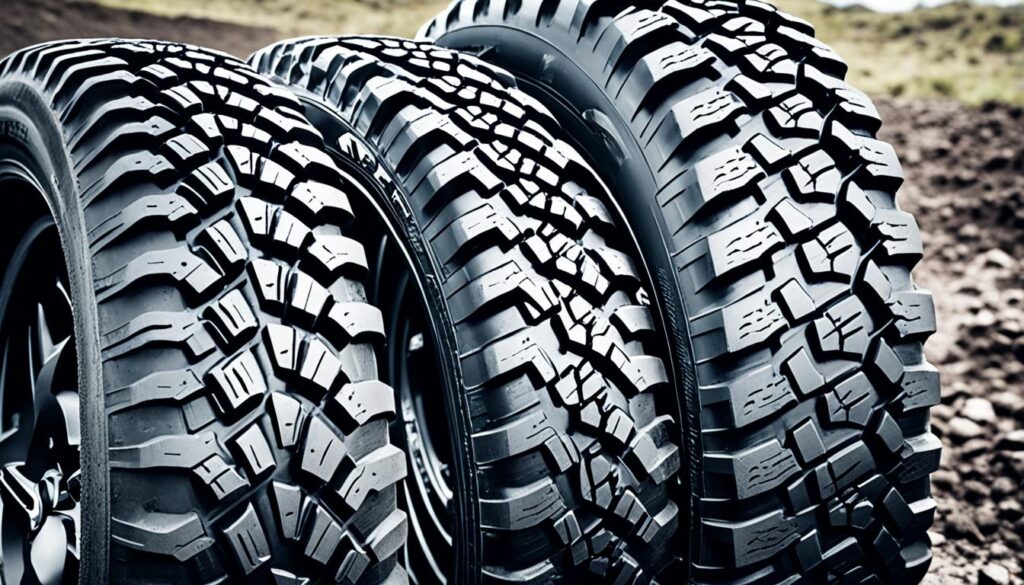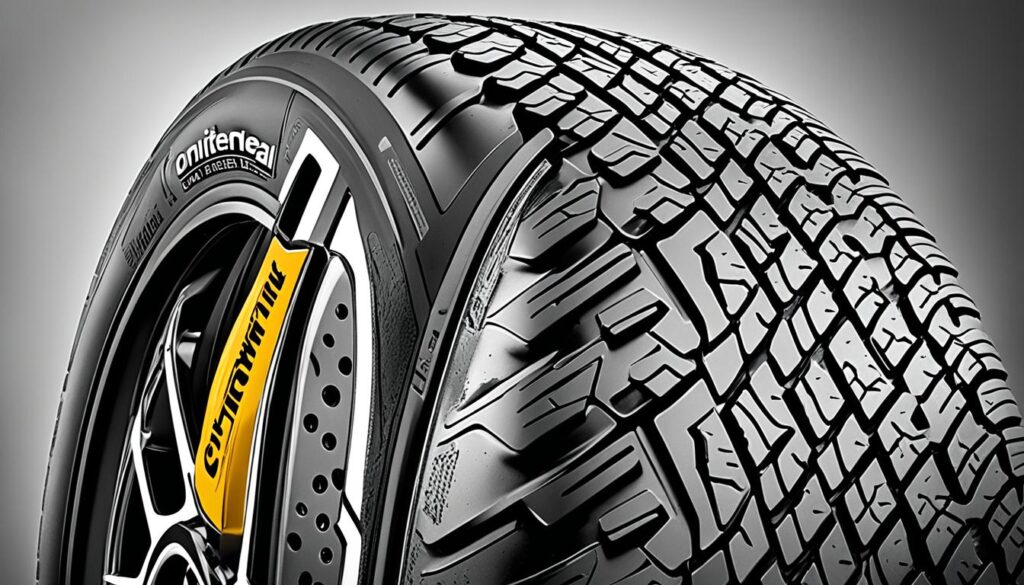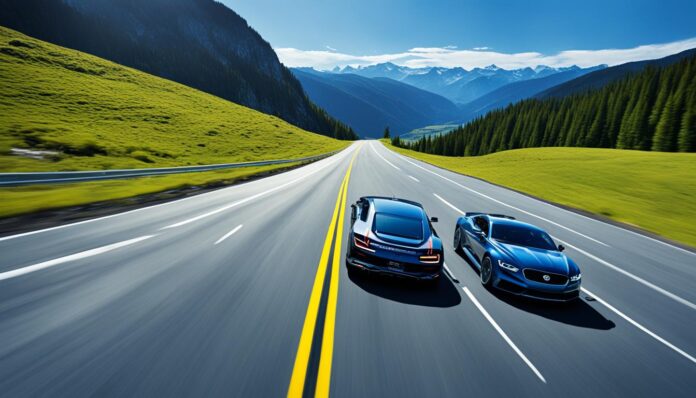As an Amazon Associate, I earn from qualifying purchases
When it comes to choosing the right tires for your vehicle, Continental and Michelin are two brands that often come to mind. Renowned for their quality and performance, these tire manufacturers have been trusted by drivers worldwide. But which brand should you choose? In this article, we will compare Continental Tires and Michelin in various categories to help you make an informed buying decision.
Key Takeaways:
- Continental and Michelin are leading tire brands known for their quality and performance.
- Both brands offer a range of tire options for various budgets and preferences.
- Consider factors such as performance, durability, and customer reviews when making your decision.
- Continental is a popular choice for budget-conscious buyers, while Michelin is known for its premium tire offerings.
- Make sure to prioritize your specific needs and driving requirements.
Budget Tires Comparison
When it comes to budget-friendly tires that balance affordability with performance, Continental and Michelin have standout options. Let’s compare the Continental EcoContact 6 and Michelin Energy Saver A/S, two popular choices for budget-conscious buyers seeking fuel-efficient tires with excellent wet weather performance and long tread life.
Continental EcoContact 6
The Continental EcoContact 6 is an impressive budget tire that offers fuel efficiency without compromising on performance. Its innovative design, optimized for low rolling resistance, helps save fuel while providing reliable traction in wet conditions. This tire’s advanced tread pattern ensures excellent grip, reducing the risk of hydroplaning and enhancing overall safety on wet roads. Additionally, the EcoContact 6 has a long tread life, allowing you to enjoy both cost savings and extended durability.
Michelin Energy Saver A/S
The Michelin Energy Saver A/S is another top contender in the budget tire category. Engineered for fuel efficiency, this tire helps improve your vehicle’s gas mileage, resulting in long-term savings. Its special tread compound and optimized tread pattern contribute to outstanding wet weather performance, delivering confident handling and reliable braking capabilities even in rainy conditions. With its durable construction, the Energy Saver A/S offers an extended tread life, making it a cost-effective option for budget-minded drivers.
The Verdict
Both the Continental EcoContact 6 and Michelin Energy Saver A/S offer great value for budget tire seekers. If you prioritize fuel efficiency, wet weather performance, and tread life, either option will provide you with a reliable and cost-effective solution. Consider your specific needs and preferences to choose the tire that best suits your vehicle and driving style.
High Performance Tires Comparison
When it comes to high-performance tires, both Continental and Michelin offer exceptional options that deliver outstanding handling, braking capabilities, and extended tread life. Let’s take a closer look at these top-performing tire models:
1. Continental ContiSportContact 5
The Continental ContiSportContact 5 is specifically designed to provide exceptional performance on both wet and dry roads. With its advanced tread compound and innovative tread pattern, this tire offers excellent grip and precise handling. It also boasts impressive braking capabilities, allowing for quick stops even at high speeds. Additionally, the ContiSportContact 5 delivers a comfortable ride, ensuring a smooth driving experience.
2. Michelin Pilot Sport 4
The Michelin Pilot Sport 4 is renowned for its exceptional performance and precise control. Equipped with a high-performance tread compound and an optimized tread design, this tire provides excellent grip on both dry and wet surfaces. Its advanced braking technology ensures short stopping distances, enhancing safety on the road. Moreover, the Pilot Sport 4 offers extended tread life, making it a durable and reliable choice for high-performance driving.
With these high-performance tires, Continental and Michelin have raised the bar when it comes to handling, braking capabilities, and longevity. Whether you choose the Continental ContiSportContact 5 or the Michelin Pilot Sport 4, you can expect exceptional performance and a thrilling driving experience.
All Terrain Tires Comparison
When it comes to tackling various terrains with confidence, all-terrain tires are a must-have for adventurous drivers. In this section, we will compare two popular options: the Continental CrossContact LX25 and the Michelin Latitude Cross.
Continental CrossContact LX25
The Continental CrossContact LX25 is designed to provide versatile traction on different surfaces, including snow, gravel, and mud. With its advanced tread pattern and innovative technology, this tire offers exceptional grip and stability, allowing you to navigate off-road adventures with ease.
What sets the Continental CrossContact LX25 apart is its commitment to comfort. The tire’s optimized tread design and specialized compound help reduce road noise and vibrations, ensuring a smooth and quiet ride on both highways and rugged terrain.
With its durability and extended tread life, the Continental CrossContact LX25 offers long-lasting performance, making it a reliable choice for drivers looking for both off-road capabilities and on-road comfort.
Michelin Latitude Cross
The Michelin Latitude Cross is another top contender in the all-terrain tire category. It is built to withstand challenging off-road conditions while providing durability and reliability.
One of the standout features of the Michelin Latitude Cross is its aggressive tread pattern, which delivers excellent traction in various terrains, including mud and snow. This tire’s superior grip allows you to confidently navigate through difficult off-road challenges.
In addition to its impressive off-road capabilities, the Michelin Latitude Cross is designed to provide a comfortable and quiet ride on paved roads. The tire’s advanced technology helps reduce road noise and enhances overall driving comfort.
With its exceptional durability and extended tread life, the Michelin Latitude Cross ensures that you can enjoy plenty of off-road adventures without worrying about premature wear and tear.
To summarize, both the Continental CrossContact LX25 and the Michelin Latitude Cross offer versatile traction, durability, and off-road capabilities. The Continental tire emphasizes comfort and a quiet ride, while the Michelin tire provides aggressive off-road grip. Whether you prioritize on-road comfort or aggressive off-road performance, these all-terrain tires have you covered.
Mud Terrain Tires Comparison
In challenging off-road conditions, having the right tires can make all the difference. When it comes to mud terrain tires, two top contenders are worth considering: the Continental TerrainContact A/T and the Michelin LTX A/T2.
The Continental TerrainContact A/T is designed to conquer tough mud and snow conditions with ease. It offers excellent traction and durability, allowing you to confidently navigate through challenging terrains. With its specialized tread pattern and advanced rubber compound, this tire ensures optimum grip in slippery and muddy conditions, providing you with a smooth and controlled off-road experience. What sets the Continental TerrainContact A/T apart is its exceptional tread life, allowing you to enjoy its superior performance for longer periods.
For off-road enthusiasts seeking excellent mud and snow traction along with long-lasting durability, the Michelin LTX A/T2 is a solid choice. This tire’s aggressive tread design provides outstanding grip on muddy and snowy surfaces, allowing you to tackle any challenging off-road adventure with ease. Additionally, the Michelin LTX A/T2 boasts a long tread life, ensuring that you can rely on its excellent performance for an extended period.

When it comes to mud terrain tires, both the Continental TerrainContact A/T and Michelin LTX A/T2 offer excellent traction in mud and snow, along with long tread life. Whether you choose the Continental or Michelin option, you can be confident in their ability to provide the necessary grip and durability for your off-road adventures.
Brand Overview and Reputation
When it comes to the tire industry, Continental and Michelin are two giants that have established themselves as leading brands in the market. Let’s take a closer look at their brand reputation, revenue, and global tire sales.
Continental: A Trusted Name in the Tire Industry
Continental is a well-established tire brand known for its commitment to quality and innovation. With a comprehensive range of tires designed for various vehicles and terrains, Continental has gained the trust of customers worldwide. In terms of revenue, Continental ranks third in the tire industry, solidifying its position as a key player in the global market.
Michelin: Leading the Way in Tire Manufacturing
Michelin, on the other hand, is a tire brand that needs no introduction. With a strong reputation and global presence, Michelin has set the bar high in terms of tire manufacturing excellence. It ranks second in the global tire industry, just behind Bridgestone, demonstrating its significant market share and revenue.
Continental and Michelin both have a solid track record in delivering high-quality tires that meet the demands of drivers worldwide. Their commitment to innovation and customer satisfaction has helped these brands build a strong reputation within the industry.
As the table below illustrates, both Continental and Michelin have achieved substantial revenue and global tire sales, contributing to their esteemed standing in the tire industry:
| Tire Brand | Revenue (in billions USD) | Global Tire Sales (in millions) |
|---|---|---|
| Continental | $13.2 | 129 |
| Michelin | $22.5 | 193 |
Based on these figures, it is evident that both Continental and Michelin have achieved significant success in terms of revenue and global tire sales, making them trusted choices for drivers around the world.
Design Features and Technologies
When it comes to tire technologies, both Continental and Michelin have developed innovative features to enhance performance, safety, and overall driving experience.
Continental Tire Technologies
Continental offers a range of tire technologies that cater to different needs and preferences. Here are some notable features:
ContiSeal: This technology allows the tire to seal punctures of up to 5mm in diameter, allowing drivers to continue their journey without the immediate need for tire change.
Run-flat: Continental’s run-flat technology enables a vehicle to continue driving even with a punctured tire, providing extended mobility and reducing the risk of accidents.
ContiSilent: Designed to enhance comfort, ContiSilent technology reduces road noise and vibrations, resulting in a smoother and quieter ride.
Michelin Tire Technologies
Michelin is renowned for its tire technologies that prioritize performance, safety, and comfort. Here are some key features:
Acoustic: Michelin’s Acoustic technology is designed to reduce cabin noise, resulting in a quieter and more enjoyable driving experience.
Selfseal: Michelin’s Selfseal technology automatically seals punctures as they occur, allowing the tire to maintain optimal pressure and reducing the risk of sudden deflation.
Track Connect: This innovative technology is aimed at high-performance vehicles and provides real-time monitoring of tire pressure and temperature, allowing drivers to optimize their performance and safety.
Both Continental and Michelin’s tire technologies aim to enhance safety, comfort, and performance on the road. Whether it’s ensuring a puncture-free journey or reducing cabin noise, these features contribute to a better overall driving experience.

Conclusion
When it comes to choosing between Continental and Michelin tires, it ultimately boils down to your specific needs and preferences. Continental offers a range of high-quality yet affordable tires, making it an excellent choice for budget-conscious buyers. Their selection includes various options for different vehicle types and terrains, ensuring you can find the perfect fit for your vehicle.
On the other hand, Michelin is renowned for its premium tires that come with advanced technologies and features. If you’re willing to invest more in your tires, Michelin offers exceptional performance and durability. Their tires are designed to provide excellent traction, handling, and comfort, giving you a superior driving experience.
When making your decision, consider factors such as pricing, warranties, and customer preferences. Continental offers affordability without compromising on quality, making it an attractive option for many. Michelin, on the other hand, provides a premium tire experience for those who value advanced technology and top-tier performance. Additionally, reading customer reviews can give you valuable insights into the experiences of other drivers and help you make an informed choice.
In the end, both Continental and Michelin are reputable tire brands, trusted by drivers around the world. Evaluate your driving needs, weigh the pros and cons, and choose the tire brand that aligns best with your requirements. Whether you prioritize affordability or premium features, both brands offer a range of options to meet your expectations.
FAQ
What are some budget tire options from Continental and Michelin?
Continental offers the EcoContact 6 tire, while Michelin provides the Energy Saver A/S tire, both known for their fuel efficiency and long tread life.
Which high-performance tires are recommended from Continental and Michelin?
Continental’s ContiSportContact 5 and Michelin’s Pilot Sport 4 are both highly regarded for their exceptional handling, braking capabilities, and extended tread life.
Are there any all-terrain tire options from Continental and Michelin?
Yes, Continental offers the CrossContact LX25 and Michelin offers the Latitude Cross, both designed to provide solid traction on various surfaces, versatility, and durability.
Do Continental and Michelin offer mud terrain tires?
Yes, Continental offers the TerrainContact A/T and Michelin offers the LTX A/T2, both known for their excellent mud and snow traction and long tread life.
How do the brands Continental and Michelin compare in terms of reputation and global presence?
Continental ranks third in the tire industry in terms of revenue, while Michelin is one of the leading global tire brands, ranking behind Bridgestone.
What are some of the design features and technologies offered by Continental and Michelin?
Continental offers technologies like ContiSeal, which seals punctures, and ContiSilent, which reduces road noise. Michelin has technologies like Acoustic, which reduces cabin noise, and Selfseal, which seals punctures.
How should I choose between Continental and Michelin tires?
Consider your specific needs and preferences. Continental offers high-quality yet affordable tires, while Michelin provides premium tires with advanced technologies and features. Price, warranties, and customer reviews should also be taken into account.
